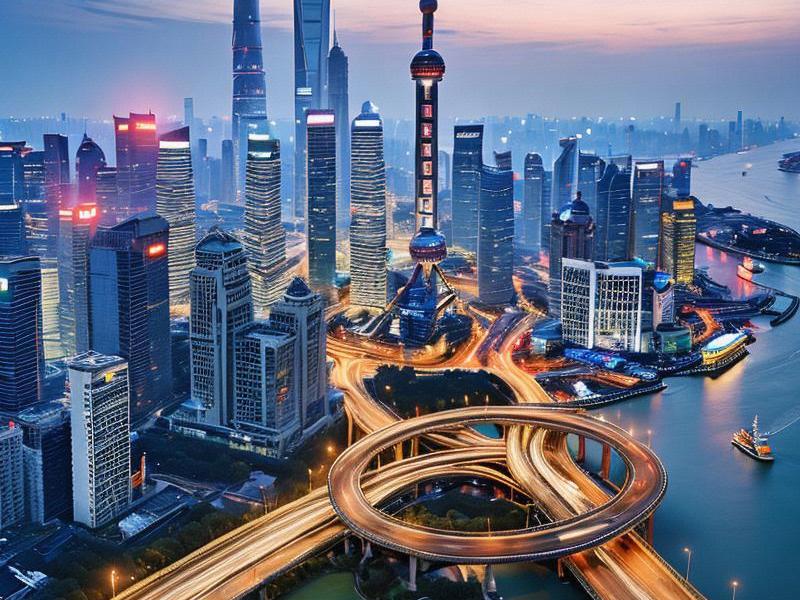
Shanghai, often referred to as the "Pearl of the Orient," is a city that seamlessly blends tradition with modernity. Its story is one of rapid urbanization, economic growth, and cultural evolution, making it a fascinating subject for exploration.
Urbanization and Infrastructure
Shanghai's urbanization journey is nothing short of extraordinary. Over the past few decades, the city has expanded at an unprecedented rate, transforming from a relatively small port city into a sprawling metropolis. The city's infrastructure has kept pace with this growth, with iconic landmarks such as the Oriental Pearl Tower, the Jin Mao Tower, and the Shanghai Tower becoming symbols of its modernity.
The development of the Pudong New Area in the 1990s marked a turning point for Shanghai. Once a rural area, Pudong has since become a hub of financial and commercial activity, home to the Shanghai Stock Exchange and numerous multinational corporations. The Lujiazui Financial District, with its skyline of gleaming skyscrapers, is a testament to Shanghai's economic prowess.
Economic Powerhouse
Shanghai's economy is one of the most dynamic in the world. As a global financial center, it plays a crucial role in international trade and commerce. The city is home to the Shanghai Stock Exchange, one of the largest stock exchanges in Asia, and the Port of Shanghai, which is the busiest container port in the world.
The city's economic success can be attributed to its strategic location, robust infrastructure, and favorable business environment. Shanghai has attracted a significant amount of foreign direct investment, with numerous multinational corporations establishing their regional headquarters there. The city's export-oriented industries, particularly in manufacturing and technology, have contributed to its economic growth.
上海龙凤419体验 In recent years, Shanghai has also been focusing on innovation and high-tech industries. The city has established several technology parks and innovation hubs, fostering the growth of startups and research institutions. This shift towards a knowledge-based economy is expected to drive Shanghai's continued economic development.
Cultural Vibrancy
Despite its rapid urbanization and economic growth, Shanghai has managed to preserve its rich cultural heritage. The city is a melting pot of different cultures, with influences from China's various regions as well as from abroad. This cultural diversity is reflected in the city's architecture, cuisine, and arts.
Shanghai's architecture is a blend of traditional Chinese styles and modern international designs. The Bund, a historic waterfront area, showcases a stunning array of colonial-era buildings that stand in contrast to the modern skyscrapers of Pudong. The city's art scene is equally vibrant, with numerous galleries, museums, and cultural institutions showcasing contemporary and traditional art forms.
Cuisine is another aspect of Shanghai's cultural vibrancy. The city is renowned for its signature dishes, such as Xiaolongbao (soup dumplings) and Shengjianbao (pan-fried dumplings). These delicacies, along with a wide variety of other local and international cuisines, can be found in the city's bustling food markets and restaurants.
Global City and Urban Challenges
上海花千坊爱上海 As a global city, Shanghai plays a significant role in international affairs and diplomacy. The city has hosted numerous international events, including the World Expo in 2010, which attracted millions of visitors from around the world. Shanghai's international airport and extensive transportation network make it a key hub for global travel and trade.
However, rapid urbanization and economic growth have also brought challenges to Shanghai. The city faces issues such as traffic congestion, air pollution, and housing shortages. To address these challenges, the government has implemented various measures, including the expansion of public transportation, the promotion of green energy, and the development of affordable housing.
Future Prospects
Looking ahead, Shanghai is poised for continued growth and development. The city's government has outlined ambitious plans to further enhance its infrastructure, promote innovation, and improve the quality of life for its residents. The Belt and Road Initiative, a global development strategy proposed by China, is expected to bring new opportunities for Shanghai as a key node in international trade and connectivity.
Shanghai is also focusing on sustainable development and environmental protection. The city has set ambitious targets to reduce carbon emissions, increase the use of renewable energy, and improve waste management. These efforts are part of Shanghai's commitment to building a greener and more sustainable future.
Cultural Exchange and Soft Power
上海夜网论坛 Shanghai's cultural exchange programs play a crucial role in enhancing its soft power on the global stage. The city hosts numerous international cultural festivals, art exhibitions, and music concerts, attracting artists and audiences from around the world. These events not only showcase Shanghai's rich cultural heritage but also foster mutual understanding and friendship among different cultures.
The city's universities and research institutions are also active in promoting cultural exchange and academic collaboration. They host international students and scholars, conduct joint research projects, and organize cultural exchange programs. These efforts contribute to Shanghai's reputation as a global center of learning and innovation.
Tourism and Hospitality
Shanghai's tourism industry has experienced significant growth in recent years, attracting millions of domestic and international tourists. The city's diverse attractions, ranging from historical landmarks to modern skyscrapers, offer something for everyone.
The Bund and Pudong are among the most popular tourist destinations, offering stunning views of the city's skyline and waterfront. The Yu Garden and the Old Town are great places to explore Shanghai's rich history and traditional architecture. The city's museums, art galleries, and cultural institutions provide insights into its vibrant arts scene.
To accommodate the growing number of tourists, Shanghai has invested in improving its hospitality infrastructure. The city boasts a wide range of hotels, resorts, and guesthouses, offering comfortable and convenient accommodation options. The city's transportation network, including its metro system, buses, and taxis, makes it easy for tourists to explore the city.
